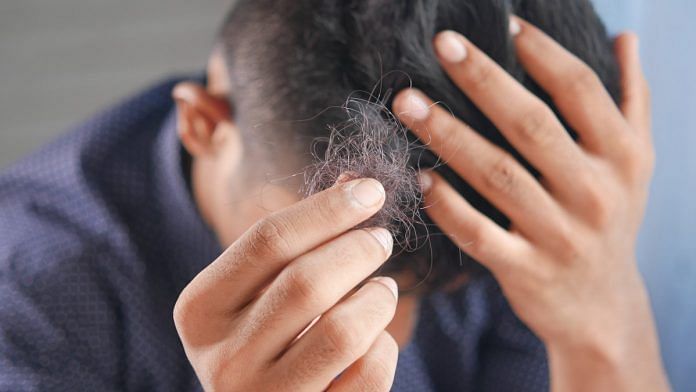Excessive hair fall is a cause of concern for many. And why shouldn’t it be? healthy, lustrous and voluminous hair act as a tool for social acceptance and validation, while giving their wearer confidence. Precisely why hair loss triggers anxiety and depression among many of its sufferers—a claim backed by a 2018 study, which analysed the physical and psychological effects of greying hair and male pattern baldness among adult men in Chennai. It found 60.3 per cent hair fall, 17.1 per cent dandruff, and 50.4 per cent baldness among men aged 18-50. There was a 37.97 per cent rate of greying among men aged 18-35 years. Additionally, it found that even though baldness is a relatively minor medical condition, it has the potential to adversely impact a person’s self-image and in turn, their mental health.
Clearly, hair loss is a more pressing problem than it seems, with researchers still trying to determine its exact magnitude. What causes a person to lose hair, after all? And can adequate nutrition help prevent it? Let’s find out.
The difference between shedding and hair loss
Every day, you lose about 100 hairs from your scalp, says The American Academy of Dermatology. That’s normal, and most people’s hair grow back. However, hair loss that is more noticeable than usual can cause distress and worry, and amounts to shedding. The medical term for this condition is ‘Telogen Effluvium’. The dermatology academy explained that stressors such as excessive weight loss, childbirth, chronic stress, high-grade fever, and surgery can all lead to excessive hair fall, or shedding. However, in such conditions, shedding stops when the body goes back to its previous state.
On the other hand, hair loss occurs when hair stops growing. The medical term for this condition is ‘Anagen Effluvium.’ Hair loss could be genetic, or caused by autoimmune disorders, drugs, hair products, and treatments.
Also read: Don’t trust the ‘superfood’ label. Here are five common foods to boost your health
Hair loss and poor nutrition go hand in hand
Hair loss is especially triggered when excessive amounts of unhealthy foods are consumed or if insufficient amounts of nutritious foods are consumed— and scientific studies are proof.
In a 2016 study involving menopausal women, researchers found that simple carbohydrate-rich foods can cause hair loss. The authors of this study concluded that eating simple carbohydrates increases production of sebum—an oily substance released by glands attached to hair follicles. Sebum is beneficial for hair health, but excess amounts can cause inflammation. If you are experiencing excessive hair fall, staying away from processed, sugary foods like candy, cakes, and biscuits, is best. Simple sugar can also be found in refined grains such as white polished rice, pasta, white bread, etc., which is why choosing complex carbs like beans, fruits, green leafy vegetable and whole grains can prove beneficial. An older study from 2010 suggested avoiding fried foods for hair health as they over activate oil and sebum glands, which can negatively affect hair health. This study, however, can’t be considered a credible one as it is merely assumptive in nature and not supported by literature. Some sources also state that aspartame, an artificial sweetener, is linked with hair loss, but there is lack of scientific evidence to claim this association.
Also read: Stay away from detox ‘scams’. No single food or drink can be your medical miracle
Foods to promote hair health
Nutrition and hair health are a relatively new area of research. A study from 2020 revealed that dietary factors such as a severe deficiency in protein, essential fats, and zinc could sometimes contribute to ‘Telogen Effluvium’. A severe calorie restriction can also lead to hair fall. A study published in 2016 concluded that women with hormonal changes, chronic stress, and/or taking medications would benefit from eating complex carbs, vitamins, and minerals regularly. Researchers in this study found that certain vitamins and minerals had a significant effect on hair health. These micronutrients are – vitamin B, vitamin C, vitamin A, zinc, iron, copper, selenium, silica, magnesium, and calcium.
While we do not yet have a clear understanding of which foods are healthful for our hair, protein, healthy fats, vitamin C, biotin, vitamin A, iron, niacin, and other B-vitamins are recommended for daily consumption to prevent and promote hair health. Lean protein obtained from cottage cheese, skinless chicken, beans, tofu, fish, eggs, greek yogurt, etc can also help boost hair health. Healthy fats can be obtained from walnuts, almonds, sunflower seeds, pumpkin seeds, flax seeds, chia seeds, and olive oil. Green leafy vegetables, citrus fruits, berries, oranges, guavas, kiwis, can all be included for vitamin C. Folate can be obtained from peas, beets, broccoli, chickpeas, liver, etc. Niacin or vitamin B3 can be obtained from salmon, peanuts, seeds, etc. Eat your iron from lean meat, dark green leafy vegetables, egg, beans, apricot.
It is believed that biotin promotes healthy hair and nail growth. However, only limited research supports biotin’s utility in healthy individuals. There were 18 cases of biotin deficiency linked to nail and hair health according to a 2017 review. In all cases, authors concluded that patients receiving biotin supplements had an underlying condition that caused poor nail or hair growth. The biotin obsession may not be justified after all. However, you can get biotin from eggs, sweet potatoes, salmon, seeds, and nuts.
Hair loss can be caused by severe dietary restrictions, not eating enough healthy fats, and consuming refined carbohydrates. Consuming a nutritious diet packed with macro and micro-nutrients may have some preventive effects. The research in this area is just beginning. Healthy eating, however, has numerous benefits. The same is true for hair health. Keep healthy foods handy.
Dr Subhasree Ray is Doctoral Scholar (Ketogenic Diet), a certified diabetes educator, and a clinical and public health nutritionist. She tweets @DrSubhasree. Views are personal.
(Edited by Zoya Bhatti)



